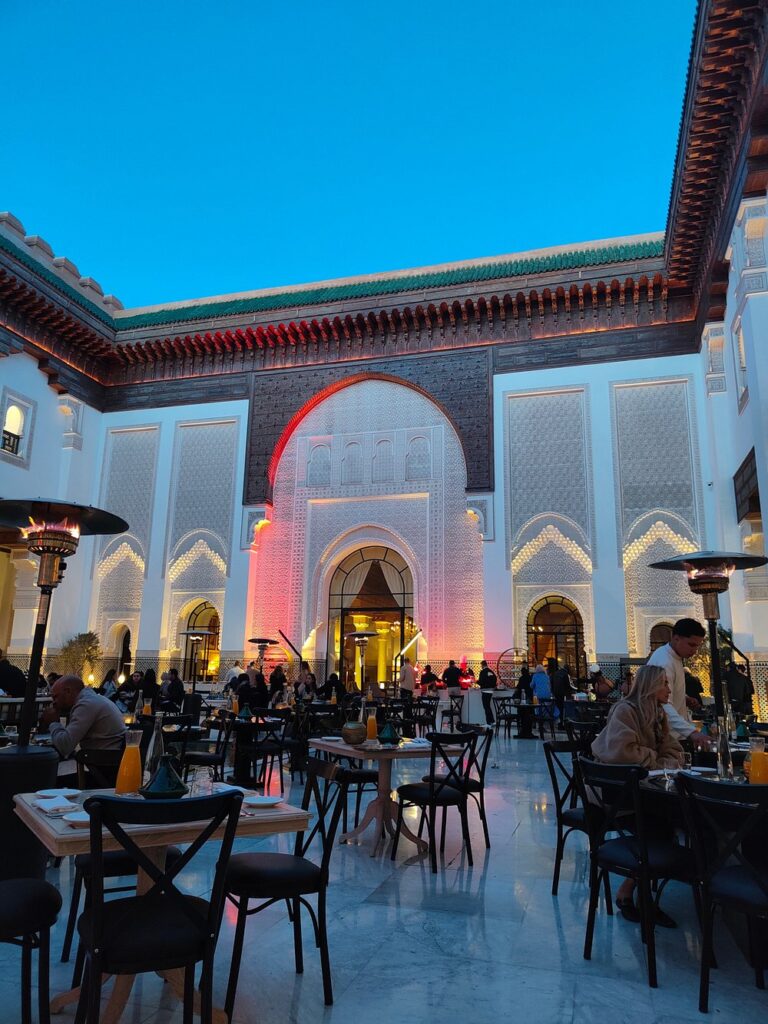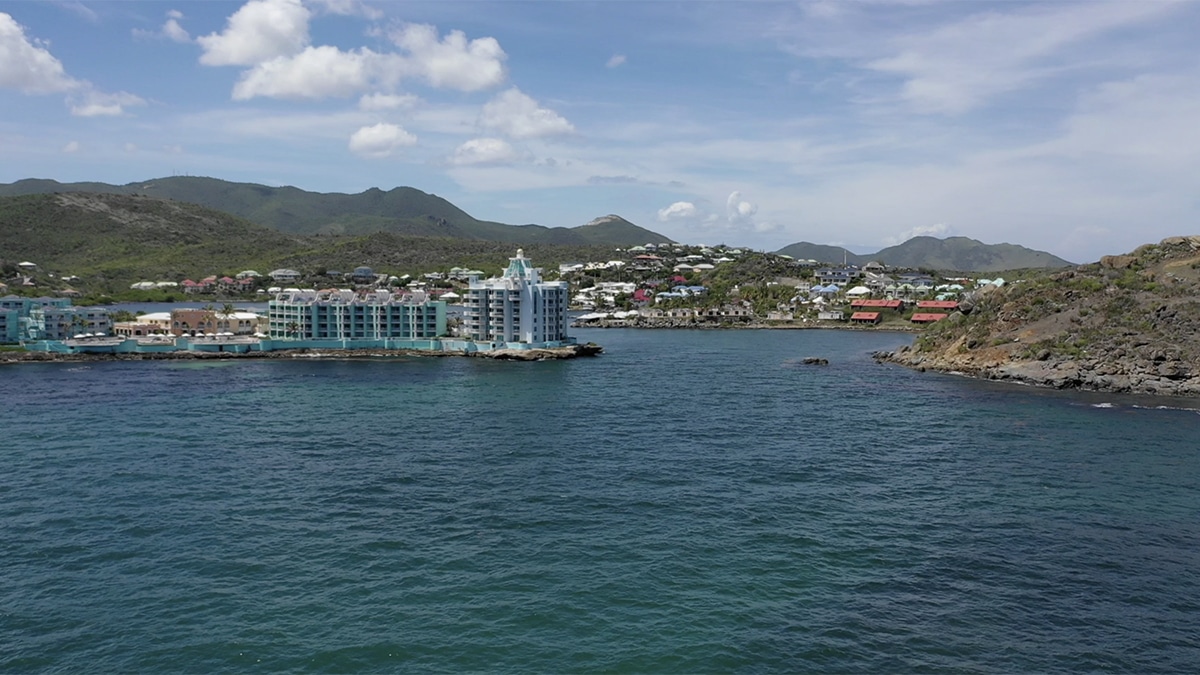Step into a world where ancient traditions meet modern comforts, where the echoes of centuries-old hospitality resound through labyrinthine medinas and opulent palaces. Welcome to Moroccan hotels – where the allure of the past intertwines seamlessly with the luxuries of today, offering travelers a truly enchanting and unforgettable experience.
I. Overview
Morocco has always been a beloved location for tourists seeking an immersive experience because of its dynamic culture, extensive history, and kind people. The core of the country’s attraction is Morocco’s hospitality sector, steeped in centuries-old traditions and practices. Moroccan hotels have carved out a position for themselves by skillfully fusing contemporary conveniences with historic charms, providing visitors with an incredibly singular and unforgettable experience, whether staying in the busy districts of Marrakech or the tranquil settings of the Atlas Mountains.
A. A Synopsis of the Moroccan Hospitality Sector
As varied as the nation itself, Morocco’s hospitality sector offers a broad selection of lodging options to suit the needs and tastes of any visitor. Moroccan hospitality extends beyond its borders, with charming guesthouses tucked away in the winding medinas and opulent resorts along the coastline.
Morocco’s reputation for friendly and accommodating service has helped the country’s hospitality sector grow. The spirit of hospitality permeates every aspect of the Moroccan experience, from being greeted with a steaming cup of mint tea upon arrival to being invited to share a traditional Moroccan meal with locals. This reputation is deeply ingrained in Moroccan culture, where hospitality is considered a sacred duty, known locally as “l’hospitalité marocain.”
B. Thesis: Moroccan Hotels Provide Special Experiences by Combining Modern Amenities with Age-Old Charms
An intriguing contrast between the traditional and contemporary is revealed within the context of Moroccan hospitality. Moroccan hotels are committed to retaining the timeless appeal of Moroccan culture and history, even as they embrace modern conveniences and luxury. Moroccan hotels stand out for their flawless marriage of contemporary amenities and historic charm, providing visitors with an unmatched level of sophistication and genuineness.
In this post, we will explore the fascinating world of Moroccan hotels, examining the rich tapestry of customs, architecture, food, and experiences that make them unique. Every business, whether a contemporary boutique hotel or the winding passageways of a centuries-old riad, embraces modern amenities while providing a window into Morocco’s rich history. Take a trip with us into the fascinating world of Moroccan hospitality, where you may experience the best of both worlds.
II. Moroccan Hospitality’s Historical Context
Morocco’s hospitality sector reflects the nation’s rich history and unique cultural heritage. It is firmly entrenched in a centuries-old tradition of friendly and gracious hospitality. Understanding Moroccan history is crucial to appreciating the true spirit of Moroccan hospitality, which is influenced by a diverse range of Arab, Andalusian, and Berber cultures.
A. Rich Moroccan Cultural Tradition of Hospitality
In Moroccan society, hospitality is highly valued; visitors are viewed as blessings and extended a warm welcome. This custom originates from Islamic teachings, which strongly emphasize charity and giving to strangers. Moroccan hospitality is a deeply entrenched value that infuses every facet of daily life, going beyond simple manners.
Moroccan friendliness is reflected in the friendly smiles of the people, the heady aromas of mint tea, and the sumptuous feasts that are lovingly prepared, whether one is in the busy medinas of Marrakech or the isolated towns nestled in the Atlas Mountains. Moroccan hospitality is unmatched, regardless of your travel destination—whether you’re a tired tourist looking for a place to stay the night or a curious traveler hoping to experience the native way of life fully.
B. Impact of Arab, Andalusian, and Berber customs of hospitality
Its people’s varied customs and traditions, which span centuries of interaction and exchange, enrich the lively mosaic of Moroccan hospitality. The indigenous Berbers who live in Morocco have a long-standing hospitality custom ingrained in their close-knit communities and nomadic lifestyle. Morocco was imbued with the refined manners and exquisite hospitality norms of Andalusian immigrants who fled persecution in Spain, while Arab influences contributed a culture of generosity and hospitality.
These many influences come together to produce a certain kind of hospitality that is only Moroccan. Every gesture and ritual reflects the rich tapestry of Morocco’s cultural past, from the complex courtesies of Arab etiquette to the elaborate tea ceremonies inherited from the Berbers.
C. Moroccan Hotels’ Development from Traditional Riads to Contemporary Facilities
Moroccan hotels have evolved to reflect the changes in Moroccan society, from the traditional customs of the past to the contemporary realities of today. The traditional riads and old courtyard residences in the center of Morocco’s medieval medinas are central to this evolution.
As a symbol of Morocco’s rich cultural legacy, riads provide a window into the country’s illustrious past through elaborate architecture and tranquil courtyards. Riads, formerly the exclusive homes of affluent merchants and nobility, have been painstakingly renovated and reimagined as stunning boutique hotels where visitors may enjoy the allure and genuineness of Moroccan hospitality in opulent settings.
Morocco has seen the rise of contemporary hotels and resorts in recent years, meeting the increasing needs of affluent tourists looking for top-notch facilities and services. Despite the stylistic and architectural differences between these institutions, they all uphold the ageless customs of Moroccan hospitality, providing visitors with an unmatched experience of luxury, comfort, and cultural immersion.
One thing has remained consistent throughout Morocco’s centuries-long evolution and adaptation to the shifting demands of the international tourism industry: the spirit of hospitality. Whether you choose to stay in a modern hotel or a traditional riad, you can be sure that your stay will be infused with the warmth, generosity, and genuine hospitality that have come to define Morocco’s timeless attractiveness.
III. Moroccan Traditional Architecture: Riads
Morocco’s architectural legacy is typified by riads, known for their elaborate woodwork, beautiful mosaics, and charming courtyards. Nestled amidst the winding streets of Morocco’s old cities, these historic homes provide a window into the nation’s rich cultural history. This section delves into the appeal of riads, their conservation, and their metamorphosis into opulent retreats for contemporary tourists.
A. The Meaning and Features of Riads
Traditional Moroccan residences called riads are built around a central courtyard called the “djemaa,” which acts as the riad’s focal point and offers a peaceful haven from the busy streets outside. A symmetrical arrangement of rooms centered harmoniously around the courtyard is a defining feature of riads.
Riad architecture, incorporating features from Andalusian, Arab, and Berber traditions, reflects Morocco’s diverse cultural influences. The intricate tile work, carved plaster, and handcrafted woodwork make the interiors elegant and serene.
B. Preserving the Architectural Elements of Riads
Because of committed attempts to preserve and restore these historic homes, many riads have managed to maintain their original architectural features over time. Every element, from the vibrant zellij tiles decorating the walls to the finely carved wooden doors, is a tribute to the skill and creativity of Morocco’s artists.
A common component of preservation efforts is the careful restoration work done by knowledgeable artisans utilizing age-old methods and supplies. The objective is to retain the riad’s distinctive character and charm for the enjoyment of future generations and to preserve the building’s structural integrity.
C. Conversion of Riads into Luxurious Hotels through Renovation
In recent years, many riads have been painstakingly restored and turned into boutique hotels, allowing visitors to experience the elegance and serenity of traditional Moroccan architecture in an opulent setting. These riads have undergone seamless renovations that preserve the historic elegance of the original building while adding contemporary conveniences and comforts.
Every element of these riad hotels, from beautiful dining spaces offering traditional Moroccan cuisine to luxurious apartments with private terraces overlooking the courtyard, is intended to enchant and amaze visitors. Remodeled riads present a singular chance to fully experience Morocco’s opulent cultural legacy while indulging in the ultimate in comfort and luxury.
In summary, riads represent Morocco’s rich history and cultural diversity and are enduring icons of the nation’s architectural heritage. These antique homes, which provide a window into the spirit of Morocco’s old cities, continue to amaze and inspire tourists worldwide via preservation and reconstruction.
IV. Moroccan Hotels with Contemporary Amenities
With its rich history and vibrant culture, Morocco has long been a destination favored by travelers seeking an exotic escape. The country has recently witnessed a surge in luxury hospitality, with hotels seamlessly blending contemporary amenities with traditional Moroccan charm. Among these establishments, several stand out for their exquisite offerings, including the Royal Mansour Marrakech, La Mamounia, Four Seasons Hotel Casablanca, Sofitel Essaouira Mogador Golf & Spa, and The Oberoi, Marrakech. Let’s delve into the allure of these exceptional properties.
- Royal Mansour Marrakech:
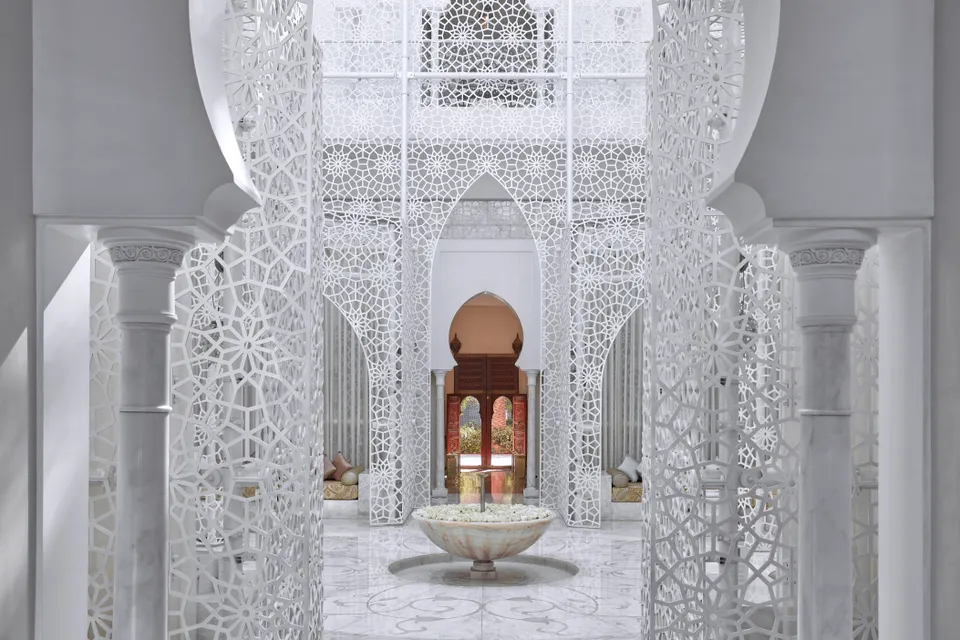
Situated amidst the vibrant thoroughfares of Marrakech, the Royal Mansour Marrakech exemplifies luxury and refinement. Inspired by the grandeur of a Moroccan medina, this hotel features lavish riads adorned with elaborate furnishings, intricate tilework, and ostentatious amenities. Every suite has a private plunge pool, luxurious marble amenities, and individualized service that embodies the highest standards of Moroccan hospitality. Guests of this palatial sanctuary can partake in Michelin-starred dining at acclaimed restaurants, relax in the tranquil spa, or simply appreciate the serene ambiance of the verdant gardens.
Booking: Royal Mansour Marrakech
- La Mamounia, Marrakech:
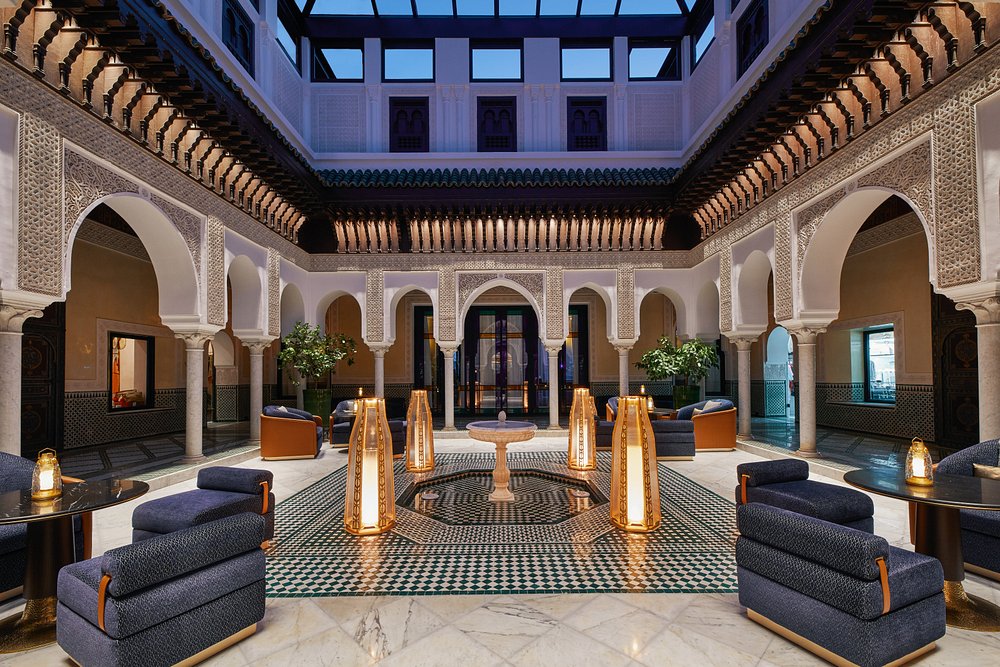
La Mamounia, widely recognized as an emblematic hotel in Marrakech, emanates an enduring sense of sophistication and magnificence. Located amid lush gardens and historic fortifications, this renowned establishment combines contemporary amenities with traditional Moroccan design. Upon entering, patrons are welcomed to opulent interiors adorned with elaborate mosaics, artisanal furnishings, and plush fabrics. The hotel provides a variety of opulent facilities, such as a spa of international renown, several swimming pools, and exquisite dining choices that highlight the opulent essence of Moroccan gastronomy. Whether guests are enjoying a stroll through the fragrant rose gardens or relaxing in an opulent suite, they are surrounded by an ambiance that exudes refined indulgence.
Booking: La Mamounia, Marrakech
- Four Seasons Hotel Casablanca:
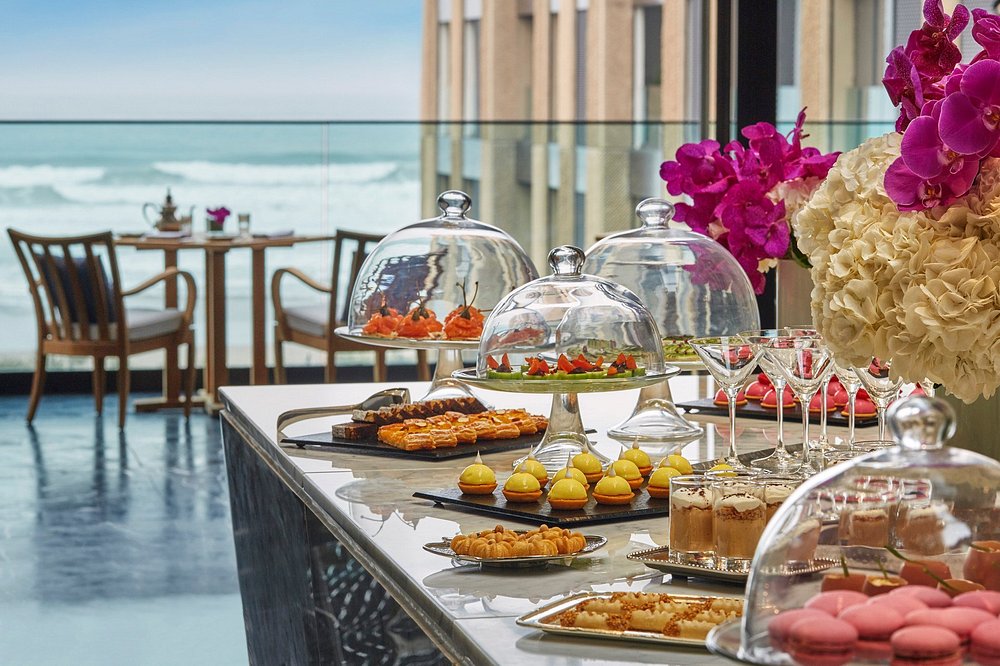
Situated in the bustling metropolis of Casablanca, Morocco, the Four Seasons Hotel Casablanca embodies modern opulence while situated on the pristine coasts of the Atlantic Ocean. Spacious ocean vistas and a streamlined contemporary design distinguish this hotel as a sophisticated haven for discerning guests. Stylishly appointed rooms and suites, a rooftop restaurant serving fresh seafood, and an expansive retreat for physical and mental rejuvenation are all available to guests. In the midst of Casablanca’s dynamic atmosphere, the Four Seasons Hotel Casablanca guarantees an indelible experience, whether one is in search of tranquility or excitement.
Booking: Four Seasons Hotel Casablanca
- Sofitel Essaouira Mogador Golf & Spa:
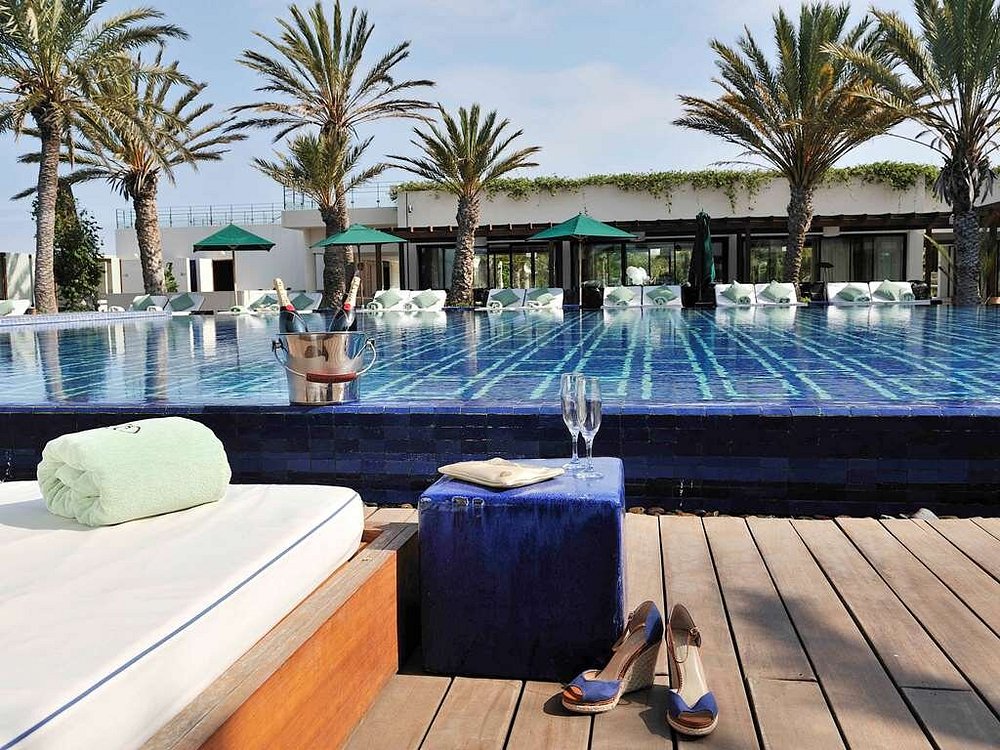
Situated in the scenic coastal municipality of Essaouira, the Sofitel Essaouira Mogador Golf & Spa seamlessly merges modern opulence with the relaxed allure of coastal habitation. Located in a verdant garden with a breathtaking view of the Atlantic Ocean, this hotel provides a serene sanctuary from the fast-paced demands of daily existence. Guests may avail themselves of well-appointed, contemporary lodgings, savor gourmet fare infused with Moroccan influences, or take to the adjacent golf course, which was meticulously crafted by the esteemed architect Gary Player. Offering an idyllic atmosphere and impeccable service, the Sofitel Essaouira Mogador Golf & Spa is the ideal location for a memorable sojourn in Morocco.
Booking: Sofitel Essaouira Mogador Golf & Spa
- The Oberoi, Marrakech:
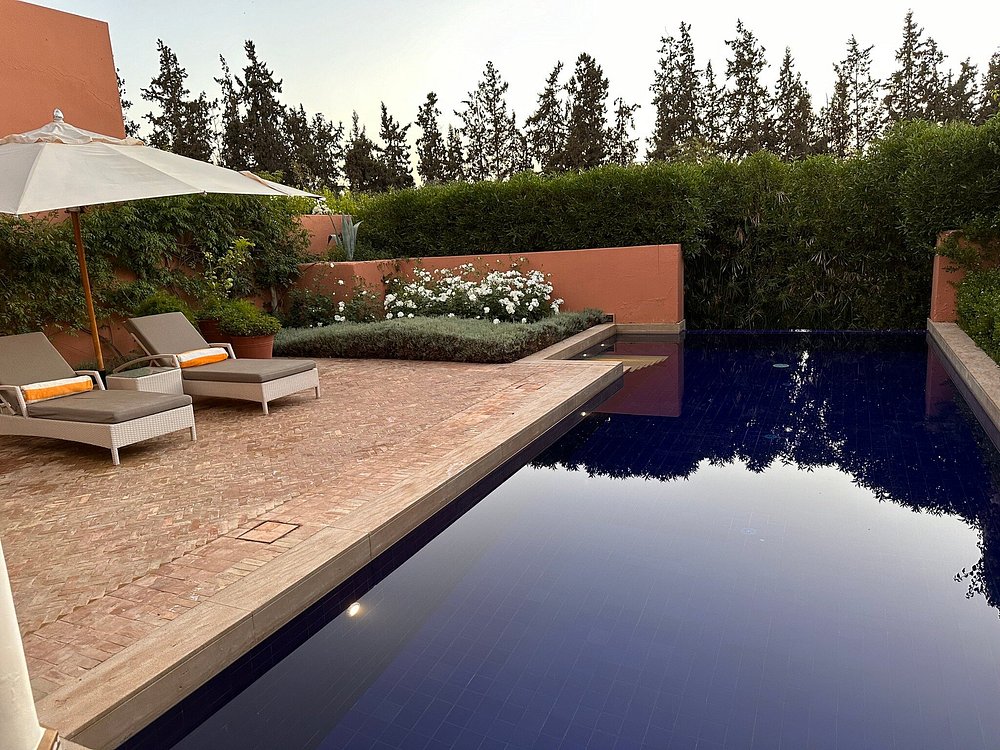
Located amidst exquisitely landscaped gardens spanning 25 acres, The Oberoi, Marrakech provides a tranquil sanctuary amidst the bustling metropolis. The hotel’s villas and accommodations showcase sophisticated interiors adorned with indigenous artwork and opulent furnishings, drawing inspiration from traditional Moroccan architecture. Guests have the opportunity to relax in secluded courtyards, bask in the sun by the infinity pool, or partake in comprehensive wellness treatments. The Oberoi, Marrakech, known for its serene atmosphere and exceptional panoramas of the Atlas Mountains, invites its patrons to partake in the pinnacle of opulence and repose in Morocco.
Booking: The Oberoi, Marrakech
V. Experiences with Culture Provided
Moroccan hotels are more than just places to rest; they serve as entry points to fascinating cultural events highlighting the diverse range of Moroccan cultural traditions. With their mouthwatering food, captivating musical acts, and enlightening guided tours, these hotels allow visitors to experience the very core of Moroccan culture.
A. Moroccan traditional cuisine includes tagine, couscous, and mint tea.
Enjoying traditional Moroccan food is one of the pleasures of any stay at a Moroccan hotel. Moroccan food is an explosion of flavors, from the well-known tagine, a flavorful stew simmered, to the fluffy couscous paired with a cornucopia of vegetables and tender meats.
In the hotel’s restaurants, guests may enjoy the distinctive flavors and fragrant spices of Moroccan cuisine, created by skilled chefs using locally sourced products. A hot cup of mint tea, a calm and energizing drink consumed all day, is a must-have for any Moroccan meal.
B. Live Music Events Highlighting Moroccan Dance and Music
Moroccan hotels frequently hold live music events highlighting Moroccan dancing and music’s lively melodies and rhythms. The musical journey that honors Morocco’s rich cultural legacy takes guests on a memorable experience, ranging from energetic Berber rhythms to soulful Andalusian ballads.
Skilled musicians and dancers captivate spectators with their artistic abilities as they take center stage. Visitors can participate in the celebrations by attempting traditional Moroccan dance techniques or tapping their feet to the music.
C. Tours with guides to nearby markets and historical sites
For those who can’t wait to get outside the hotel, guided trips to neighboring historical monuments and markets provide an intriguing look into Morocco’s vibrant street life and rich past. Experienced tour leaders accompany visitors through historic medinas, where winding lanes hide priceless finds and historic sites dating back centuries.
Discover the lively ambiance of Moroccan souks, where lively market stalls brim with handcrafted items, colorful linens, and exotic spices. Visitors can gain a deeper understanding of Morocco’s rich and varied legacy by participating in guided excursions, which give insightful perspectives into the country’s history and culture.
The cultural experiences that Moroccan hotels offer their guests are an essential component of their stay, offering chances for immersion, investigation, and learning. Visitors may fully experience the rich tapestry of Moroccan culture through guided excursions, live music events, and indulging in traditional cuisine—memories that will last a lifetime.
VI. Including Moroccan Crafts and Art
Moroccan hotels use traditional crafts and décor to create an ambiance of timeless elegance and authenticity, showcasing the nation’s rich artistic legacy. Every element showcases the talent and creativity of Morocco’s artisans, from the handcrafted textiles that cover the furnishings to the elaborate mosaic tiles that grace the walls.
A. Using Handcrafted Textiles and Mosaic Tiles for Traditional Moroccan Décor
Moroccan hotels use traditional décor, which frequently consists of ornate woodwork, colorful mosaic tiles, and handwoven textiles. Mosaic tiles, sometimes called “zellij,” are carefully placed to produce gorgeous geometric shapes and patterns that cover walls, ceilings, and floors.
The hotel’s furnishings are made cozier and more textural by handwoven carpets, blankets, and cushions made by expert artisans utilizing age-old methods passed down through the centuries. Luxurious drapes and furniture upholstering are common uses for richly embroidered textiles, or “fascist,” which lend an air of wealth to interior design.
B. Encouragement of Regional Craftsmen and Artists
Moroccan hotels are essential in helping the region’s artists and craftspeople by giving them a venue to exhibit and receive recognition from visitors from all over the world. Many hotels work directly with neighborhood artisans to create personalized pieces that capture the distinct look and feel of the establishment.
The hotel or neighboring artisan markets provide a variety of unique items for guests to purchase, such as hand-carved wooden furniture and delicately painted ceramics. In addition to preserving Morocco’s creative legacy, hotels’ support of regional craftspeople contributes to the continued existence of traditional crafts, which are essential to the nation’s identity.
C. Shops selling authentic Moroccan goods as souvenirs
The hotel’s souvenir stores provide a carefully chosen assortment of genuine goods, from handcrafted ceramics and pottery to finely carved woodwork and leather goods, for those anxious to bring home a piece of Moroccan artistry. These trinkets serve as treasured keepsakes of their trip to Morocco and offer a concrete link to the nation’s rich cultural legacy.
Additionally, visitors can help local artists and communities by shopping at souvenir shops, as a portion of the sales earnings are frequently used to fund initiatives that assist sustainable development and economic empowerment. Guests can feel good about supporting the promotion and preservation of Moroccan arts and crafts for future generations by buying souvenirs from hotel stores.
Incorporating Moroccan art and crafts into hotels celebrates Morocco’s rich cultural legacy while improving the visitor experience. Moroccan hotels provide visitors with an immersive and genuine experience that honors the nation’s creative heritage with traditional décor, support for regional artists, and souvenir sales.
VII. Initiatives for Sustainability
Moroccan hotels have made great strides in introducing sustainability programs meant to lessen their influence on the environment, help the community, and protect the nation’s natural resources in the last few years. These activities, which range from promoting sustainable tourism projects to adopting eco-friendly methods, demonstrate a commitment to responsible stewardship and a determination to guarantee the long-term health of Morocco’s hospitality business.
A. Adoption of Sustainable Practices: Water Conservation, Solar Power
Moroccan hotels have made eco-friendly practices a cornerstone of their operations, using sustainable technologies and attempting to reduce their carbon footprint. One of the most noteworthy achievements is the extensive use of solar panels to capture abundant sunshine and produce clean, renewable energy for hotel operations.
Hotels prioritize water conservation initiatives in addition to renewable energy because they understand how important it is to protect this valuable resource in an area where water shortage is an urgent issue. Low-flow showerheads and faucets, rainwater collection systems, and wastewater recycling initiatives are a few ways hotels can cut back on water use and lessen their environmental effect.
B. Encouragement of Local Communities and Protection of Environment
Hotels in Morocco are firmly committed to protecting the nation’s natural resources and helping local communities because they understand how vital sustainable tourism is to the welfare of the environment and the people who depend on it. Several hotels value collaborations with area vendors and craftspeople, obtaining products and services locally to boost the local economy and encourage cross-cultural interaction.
Hotels contribute financially to projects that protect Morocco’s biodiversity and natural environment. These initiatives involve saving delicate ecosystems, repairing damaged habitats, and encouraging eco-friendly travel behaviors that reduce environmental adverse effects.
C. Accreditation and Appreciation for Eco-Friendly Travel Initiatives
Many Moroccan hotels seek certification from reputable organizations like EarthCheck, Green Key, or the Global Sustainable Tourism Council (GSTC) to show their dedication to sustainable tourism. These certifications are an industry standard and confirm a hotel’s sustainability policies.
Apart from official certifications, industry groups, governmental bodies, and non-profit organizations also award and recognize hotels for their sustainable tourism endeavors. These honors serve as a source of inspiration and incentive for other hotels to follow suit and validate the hotel’s dedication to sustainability.
Sustainability activities are essential to the Moroccan hospitality sector, which is dedicated to responsible tourism practices, community empowerment, and environmental stewardship. Morocco’s hotels are paving the way for a more resilient and sustainable tourism industry by adopting eco-friendly practices, assisting local communities, and pursuing certification and recognition for their achievements.
VIII. Case Studies of Model Moroccan Hotel Establishments
This section will examine a few model Moroccan hotels that perfectly combine contemporary amenities with traditional charms. These case studies will highlight the best of Moroccan hospitality with thorough descriptions, notable feature highlights, guest testimonials, and reviews.
A. An explanation and synopsis of the chosen hotels
Marrakech’s Riad Farnatchi: Nestled in the heart of Marrakech’s historic medina, the elegant boutique hotel Riad Farnatchi is housed in a beautifully renovated 17th-century riad. Sophisticated tourists can find an intimate and exclusive hideaway at Riad Farnatchi, which has eleven apartments and a tranquil courtyard garden.
In the Atlas Mountains, Kasbah Tamadot: Sir Richard Branson’s stunningly gorgeous getaway, Kasbah Tamadot, is situated in the picturesque foothills of the Atlas Mountains. This opulent hotel, surrounded by lush gardens and expansive views of the surrounding mountains, has 28 uniquely designed rooms and suites that highlight traditional Moroccan craftsmanship and design.
La Mamounia, Morocco: The magnificent royal hotel La Mamounia, a storied establishment in the center of Marrakech, radiates ageless beauty and grace. Located in the city’s center, La Mamounia provides guests a sumptuous hideaway with fine furnishings and artwork throughout its vast gardens.
B. Emphasizing Special Features that Combine Contemporary Comforts with Timeless Charms
The Riad Farnatchi skillfully fuses contemporary conveniences with traditional Moroccan architecture to offer visitors a peaceful haven in the center of Marrakech’s busy medina. Highlights include a magnificent rooftop patio, an opulent spa with conventional hammam treatments, and individualized service tailored to each guest’s requirements.
Visitors are mesmerized by Kasbah Tamadot’s breathtaking surroundings and traditional Moroccan charm. Every element of the hotel, from the conventional Berber tents tucked among the gardens to the infinity pool overlooking the mountains, displays its dedication to providing a one-of-a-kind and unforgettable experience.
La Mamounia enthralls visitors with its unmatched luxury and classic elegance. Nestled among sunloungers and palm trees, the hotel’s famous pool is a tranquil haven in the middle of the metropolis. The hotel’s world-class restaurants offer exquisite dining experiences, and its luxurious spa is the perfect place for guests to unwind.
C. Reviews & Testimonials from Visitors
Royal Mansour Marrakech:
- “Our stay at the Royal Mansour Marrakech was an experience unlike any other.” Every aspect was impeccable, from the moment we entered the stately lobby until we reluctantly checked out. With their opulent furnishings and private plunge pools, the riads transport guests to a land beyond their wildest imaginations. The staff exceeded all expectations in providing impeccable service that ensured our stay was truly memorable. The Michelin-starred restaurant’s culinary prowess astounded us during our meal there. “In every way, this hotel surpassed our highest expectations.”
- “Remaining at the Royal Mansour Marrakech is an immersion in Moroccan opulence; it transcends mere lodging. The meticulousness is remarkable, encompassing the elaborate tilework as well as the aromatic gardens. The spa experience was sublime; indulgent treatments and traditional hammams left us feeling revitalized. We eagerly anticipate our return to this haven of luxury.”
La Mamounia, Marrakech:
- “For good cause, La Mamounia is a legendary hotel. Upon entering the premises, one is immediately swept away to an alternate realm characterized by sophistication and allure. The architectural design is awe-inspiring, the gardens are verdant and tranquil, and the accommodations are opulent havens of convenience. From the instant we arrived, we were treated like royalty, receiving individualized service and meticulous attention to detail. The hotel’s restaurants offered a gastronomic exploration of authentic Moroccan cuisines, while the spa served as an oasis conducive to relaxation. Our time at La Mamounia was an unforgettable experience.”
- “For an unparalleled experience in Marrakech’s opulence, your search is limited to La Mamounia.” Every element of this hotel emanates sophistication and elegance, from its breathtaking architecture to its impeccable service. The meticulousness is apparent in all aspects, including the aesthetically pleasing mosaics and the delightful gardens. We delighted in spending our days lounging by the pool and perusing the historic grounds, as our room was a haven of peace. “La Mamounia exceeded our highest hopes and instilled in us a strong desire to revisit.”
Four Seasons Hotel Casablanca:
- “Our sojourn at the Four Seasons Hotel Casablanca was exceptionally remarkable. Outstanding ocean views and a sophisticated hotel design create the ideal environment for an unforgettable stay. Our accommodation was immaculately appointed and voluminous, with every contemporary amenity conveniently accessible. The rooftop restaurant and spa were havens of relaxation, while the former featured delectable cuisine and breathtaking vistas. We cannot wait to revisit this opulent sanctuary, where the staff went above and beyond to ensure our every need was met.
- “The level of service and meticulousness at the Four Seasons Hotel Casablanca astounded us the instant we set foot inside. Our arrival was met with cordiality and hospitality from the staff, who immediately made us feel at home. Every moment of our stay was memorable, as our accommodation was a luxurious retreat with breathtaking ocean views. Every experience, from relaxing by the pool to receiving a spa treatment, was exceptional. Our highest recommendation is for this hotel.”
Sofitel Essaouira Mogador Golf & Spa:
- “Every moment of our sojourn at the Sofitel Essaouira Mogador Golf & Spa was perfection.” The hotel’s Spectacular setting offers a tranquil atmosphere that perfectly complements its view of the Atlantic Ocean. Spacious and tastefully appointed, our accommodation featured a private balcony from which we were able to take in the sea breeze. My spouse found great pleasure in the golf course, whereas I relished in opulent wellness treatments. With their attentiveness and friendliness, the staff ensured that our entire stay was impeccable. We departed with a sense of rejuvenation and relaxation, eagerly anticipating our subsequent sojourn.
- “Our stay at the Sofitel Essaouira Mogador Golf & Spa was beyond phenomenal. The hotel’s contemporary architecture and serene ambiance elicit an immediate feeling of serenity upon your arrival. Our accommodation was exquisitely furnished with opulent touches and breathtaking ocean views. Our days were spent investigating the picturesque town of Essaouira and unwinding by the pool, while our evenings were spent at the hotel’s restaurant savoring delectable fare. Throughout our sojourn, the staff’s attentiveness and accommodation elevated our status to that of valet guests. Our eager anticipation awaits our return to this enchanting enclave.”
The Oberoi, Marrakech:
- “Our sojourn at The Oberoi, Marrakech was positively enchanting. Upon our arrival, we were cordially welcomed and extended a gracious hospitality that persisted for the duration of our sojourn. The hotel premises are aesthetically magnificent, featuring verdant gardens and breathtaking vistas of the Atlas Mountains. Elegantly appointed with every modern convenience conceivable, our villa was a luxurious sanctuary. We delighted in indulging in spa treatments and reclining by the pool during the day, and the dining options were exceptional. Our anticipation was piqued and our expectations were far surpassed by The Oberoi.
- We had an extraordinary time during our stay at The Oberoi in Marrakech. Everything about the hotel reflects the meticulousness of the management, from the magnificent architecture to the impeccable service. A sanctuary of luxury, our villa featured a private courtyard and breathtaking vistas of the surrounding countryside. From dinner reservations to excursion arrangements, the staff went above and beyond to guarantee our stay was flawless. “Our departure was marked by a sense of relaxation and rejuvenation, and we are already devising our subsequent itinerary for this haven of serenity.”
IX. Concluding Remarks
As we conclude our investigation into Moroccan hotels, it is clear that these businesses provide a tasteful fusion of contemporary conveniences and historic charm, giving visitors an incredibly distinctive and remarkable experience. Moroccan hotels fascinate visitors with their timeless beauty and genuine hospitality, whether they are staying in the grand palaces of Marrakech or the tranquil riads of the medina.
A. Summary of How Moroccan Hotels Blend Traditional Charm with Modern Amenities
Moroccan hotels create a magnificent yet authentic ambiance by skillfully fusing modern conveniences with traditional charm. These accommodations provide every comfort while engrossing visitors in Morocco’s rich cultural legacy, offering guests the best of both worlds. They range from the slick design of modern resorts to the elaborate architecture of medieval riads.
B. Consideration of the Importance of Moroccan Culture Preservation in the Hospitality Sector
It is crucial that Moroccan culture be preserved in the hospitality sector for the benefit of Morocco’s identity and legacy and the nation’s tourism economy. Moroccan hotels significantly preserveng Morocco’s rich creative legacy for future generations by welcoming local artists, supporting customs, and presenting the country.
C. Urge Visitors to Moroccan Hotels to Take Advantage of the Best of Both Worlds
Moroccan hotels provide an ideal location for tourists looking for an exceptional experience that blends luxury with genuineness. There’s something for everyone to enjoy, whether it’s strolling through the medina’s narrow lanes, enjoying a traditional hammam treatment, or tasting Moroccan food.
Why then wait? Travel to Morocco and stay in its enchanted hotels to enjoy the best of both worlds. Moroccan hotels provide a warm welcome and a fantastic experience that will make you want to return anytime, whether you’re looking for adventure, leisure, or cultural immersion.
FAQS:
Does Morocco have hotels?
Yes, Morocco has a wide range of hotels catering to various budgets and preferences.
What are hotels called in Morocco?
Hotels in Morocco are typically called “hotels” or “riads.” Riads are traditional Moroccan houses or palaces with interior courtyards or gardens that have been converted into boutique hotels or guesthouses.
Can you stay in a hotel with your girlfriend in Morocco?
Yes, you can stay in a hotel with your girlfriend in Morocco. Morocco is a relatively liberal Muslim-majority country, and staying together in hotels is generally accepted, especially in tourist areas. However, it’s always a good idea to be respectful of local customs and cultural sensitivities.
What hotel did Winston Churchill stay at in Morocco?
Winston Churchill famously stayed at the La Mamounia Hotel in Marrakech, Morocco. This luxurious hotel, known for its opulent décor and historic significance, has hosted numerous dignitaries, celebrities, and royalty over the years.

